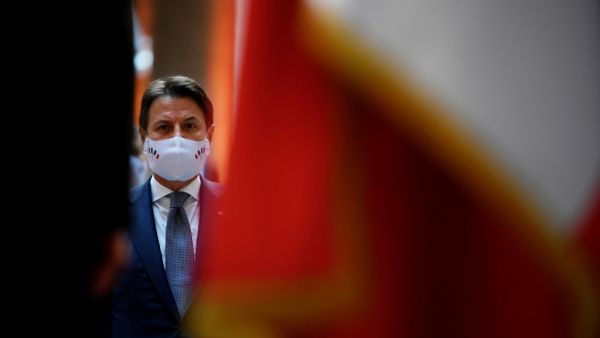Italian Prime Minister Giuseppe Conte has resigned, opening the way for formal consultations on how to overcome the political crisis.
President Sergio Mattarella will start consultations with party leaders soon, his office said in a statement on Tuesday, adding that Conte had been asked to stay on in a caretaker capacity as the talks continued.
Conte lost his absolute majority in the upper house Senate last week when a junior partner, the Italia Viva party headed by former premier Matteo Renzi, quit in a row over the government's handling of the coronavirus crisis and economic recession.
Italian Prime Minister Giuseppe Conte has resigned https://t.co/2FdC4YHuza
— BBC News (World) (@BBCWorld) January 26, 2021
Renzi in particular warned he risked wasting the EU funds with a 220-billion-euro spending plan that he said failed to address Italy's long-term structural issues.
Despite days of talks with senators to seek their support, he looked set to lose a crucial vote on judicial reform in the coming days.
Choppy waters of Italian politics
Conte is hoping to get Mattarella's support to try to form a new coalition government that can steer the country as it battles the pandemic and an economic recession and creates a spending plan for the sum Italy is getting in European Union recovery funds.
Conte, a once obscure law professor, has proved himself remarkably adept at navigating the famously choppy waters of Italian politics.
Since the 2018 elections, he has been at the helm of two governments of different political shades.
The first was a fractious and unashamedly populist coalition between M5S and Salvini's League, which ended when the latter pulled out in August 2019.
Conte went on to preside over another unlikely coalition, the so-called Conte II government, between M5S and the PD, two former sworn enemies.
Opposition presses for early election
Mattarella, Italy's largely ceremonial head of state, can ask Conte to try to form a broader coalition government, appoint a largely technical government to steer the country through the pandemic or dissolve parliament and call an election two years early.
Italian prime minister Giuseppe Conte resigns in tactical bid to form new coalition https://t.co/0BHzKaHo5G
— The Independent (@Independent) January 27, 2021
The current coalition of the 5-Star Movement, Democratic Party and smaller Leu party are all hoping for a third Conte government.
Conte's first government starting in 2018 was a 5-Star alliance with the right-wing League party led by Matteo Salvini that lasted 15 months.
His second, with the Democrats, lasted 16 months.
Salvini and centre-right opposition parties are clamouring for an early election, hoping to capitalise on polls prior to the government crisis that showed high approval ratings for the League and the right-wing Brothers of Italy party led by Giorgia Meloni.
Salvini has blasted the "palace games and buying and selling of senators” of recent days as Conte has tried to find new coalition allies, claiming that Conte is incapable of leading Italy through the crisis.
"Let’s use these weeks to give the word back to the people and we’ll have five years of a serious and legitimate parliament and government not chosen in palaces but chosen by Italians," Salvini said on Monday.
Pandemic conditions worsen
Italy was the first European country to face the full force of the Covid-19 pandemic and has since suffered badly, with the economy plunged into recession and deaths still rising by around 400 a day.
Parts of the country remain under partial lockdown, the vaccination programme has slowed and a deadline is looming to agree plans to spend billions of euros in European Union recovery funds.
Opinion polls show that Conte is Italy's most popular leader, with an approval rating of 56%, almost 20 points above the next closest politician, according to a poll published by Corriere della Sera daily on Saturday.
This article has been adapted from its original source.








